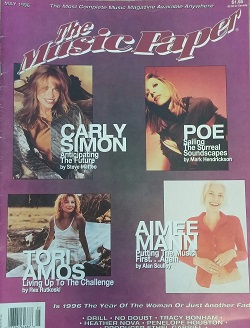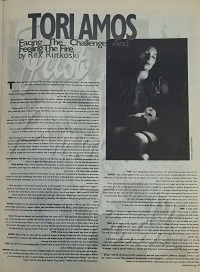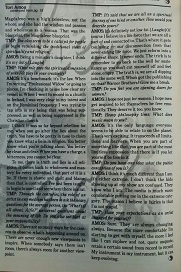|

songs | interviews | photos | tours | boots | press releases | timeline
The Music Paper (US)
May 1996

TORI AMOS
Facing The Challenge And Feeling The Fire
by Rex Rutkoski
Tori Amos has but one request: "The only thing I beg you is, no exclamation points," she says, smiling as she sends her interviewer off to his keyboard to write. "That's the only thing I'm prejudiced over."
A harmless enough favor to honor, yet perhaps a surprising wish for an artist whose career so far has been a decided exclamation, challenging the way pop music can be presented. This famous Amos even has a way of making "low key" an adventure in listening and watching.
Not this former child piano prodigy is back with another collection of strong feelings, Boys for Pele (Atlantic), her third solo album since she Richtered onto the scene with her 1992 debut, Little Earthquakes, followed by 1994's Under the Pink.
Proving quickly to be no shy artistic flower, Amos' first two albums saw her writing and singing with frankness, often graphically, about victims, emotional dependency, violence and rape, sexuality, religion and the quest for belief in oneself.
The subjects and her style resonated for many, winning her a base of fans that has been described as "amost obsessive" and sending her first two albums to platinum. Vogue heralded her arrival by suggesting that, in using victimization as impetus for empowerment, "Amos has rescued women's pop from decades worth of weepy, introspective types."
So, once again, Tori Amos finds herself her own toughest act to follow. After her relationship with companion and producer Eric Rosse ended, she chose to produce herself on Boys for Pele, which takes its name from the Hawaiian volcano.
She recorded primarily in an old church in Delgany, Ireland, with the famed Black Dyke Mills Band adding horns to several tracks. Additional recording was done in a Georgian house in Ireland's County Cork, in England with the Sinfonia of London and in New Orleans. In addition to her trademark piano, Amos plays harpsichord on several of the 18 tracks. The first single, "Caught a Lite Sneeze," was embraced by alternative and adult alternative formats. Musically and vocally, on this album Amos challenges the listener to pay attention, changing dynamics and styles in mid-song, singing lyrics that can be obscure and, in general, taking chances that almost invite repeated listens in an effort to acquire this particular taste.
THE MUSIC PAPER: Many musicians seem to take the easy way out, going for immediate accessibility with an album, but Boys for Pele challenges people to take some time out and not gloss over it.
TORI AMOS: What I think happens once you have a, quote unquote, bit of success as a musician, is sometimes you forget your intentions, why you are making music. It becomes about numbers and who's gonna play it and many other variables.
And it's not wrong to think of those things. I'm just saying a lot of times that becomes the priorities, instead of musicians challenging themselves first and therefore challenging their audience and therefore the whole market gets challenged, so you have a lot of challenging music out there. Then the medium rises to another level.
With this album I recommend a good bottle of red. [Laughs] I'm a white drinker myself, but I suggest a bottle of red because the record is about boy blood. I thought I needed to drink it when I was beginning to write this work. By the end of it, that's what the whole record was about. I didn't need to drink boy blood anymore to feel my own fire. But I thought I did. That's where I got into all sorts of trouble.
TMP: Do you feel you've found an approach to recording with this album that you are going to stay with for a while?
AMOS: Probably not. You know me. I always change. [Laughs] I will say this, I want to stay with trying to make things sound live to capture what a real instrument sounds like. Being a piano player and getting into eraly keyboards is something that was really important to me. Everything else I will experiment with in different ways in the future.
I [liked the way this album] was recorded from the sonic end -- that approach about getting the most out of instruments, and I worked with my life sound men to achieve the power I achieve live. People who are at my live shows say, "When I hear it live it makes so much more sense to me than when I hear it on the record." No matter how much they say they like the record, they say something about the power of the piano live. So I said to myself, "Why don't I get my live guys to try to make this happen on tape?"
TMP: What do you hope people take from this album?
AMOS: These songs are alive. All the songs I'm known as having written are alive. These songs freely brought me to a place of the hidden feminine, the hidden parts of myself that I tried to get desperately through the men in my life. It's a journey into the unconscious.
TMP: You seem to be encouraging people to rethink what it means to be a man, what it means to be a woman, and to rethink the dynamics of relationships.
AMOS: And what it means to be both. [Laughs] Really, the reprogramming that is taking place on the planet is very exciting. Naturally, before you can reprogram, you have to break down the old program. Before you can do that you have to acknowledge your part in it. Songs like "Professional Widow" and "Blood Roses" had to come forth before "Hey Jupiter," before there could be compassion.
TMP: You're talking about reprogramming in the sense of how we view who we are?
AMOS: I find a lot of people come up to me and go, "I used to think a certain way and I just had to reflect on it." And they will laugh and say, "Now I can't believe I went along in thinking certain ways." They didn't really feel that way; it just seemed right.
There are sometimes real subtle belief systems. You think you are not caught up in the schmooze but you really are. I am a tough person to be around. Even though I'm a good fellow, a groovy [laughs] kind of person, when it comes down to being a competitor, I'm fierce; I'm a lioness. Sometimes, though, there are times when it's like, "Tori, we don't need to go on a hunt tonight. We have a smorgasbord laid out in front of us. You have this person who just wants to be with you as a person." Sometimes I'm so geared up for the hunt. I've been hunting since I was two and a half on the piano. I've had to.
This whole record has brought the humanness to my woman. I really tried to bring in a few fragments to make me a lot more human. Bering truthful, sometimes the musicain is not human.
TMP: In what sense?
AMOS: It's very mcuh, again, about the physicality of it, the practicing. It's kind of like being an athlete. Sometimes the discipline and drive and pushing your body and yourself so much to achieve the skill keeps you from taking a walk in the rain. And the musician goes, "We aren't ready. We have to practice." I say, "Come on, 15 minutes more ain't gonna make you great"
TMP: As the father of two daughters, I try to be sensitive to the challenges of being a woman. You've spoken about hoping, with your music, to help women claim their own power. How can men help them do that?
AMOS: The blueprint of Mary Magdalene has not been passed own. As I was on my knees in Oklahoma City and crawling to a phone that wasn't ringing, that's when I began the song "Blood Roses"; that's how far gone I was.
I was looking to the outside for my woman's worth. I was so fragmented. Sometimes I was so in my element you would think I had the power to divide France. And other times I would look at me and I was a shell. As I started to smell the scent of [personal] fragmentation and I started to go back in bloodline, then it started. I said to myself, "Hold on a minute [mentally insert exclamation point here]. This is so much bigger than my life."
Being a little bit of a history buff, I started to read and open myself to different concepts. I went to see the medicine women. They pointed in the direction of the Magdalene. I saw there was something hidden that needed to be explored. What I discovered was that many scholars believed Mary Magdalene was a high priestess, not the whore, and she had the wisdom and passion and wholeness as a woman. That was the blueprint; the Magdalene blueprint.
TMP: You also seem to be a catalyst for people to begin rethinking the traditional views of spirituality and religion...
AMOS: Being a minister's daughter, I think it's my duty. [Laughs]
TMP: What role does the spiritual dimension of your life play in your creativity?
AMOS: It's a benchmark; it's the law. When I'm writing "Professional Widow" or going to places, I'm checking in to see how clear my vessel is. When I went to record in a church in Ireland, I was very clear in my intent and on the [feminine] frequency I was trying to tap into in my being that was being suppressed, as well as being suppressed in the Christian church.
I think it was so far beyond rebellion for me, when you go after the lies about the truth. You have to be pretty in tune to claim you know what a lie is in religion. You better know what you're talking about. You better be clean and clear. When you have a charge, a bitterness, you cannot be clear.
To me, there is truth and lies in all religions. It comes back to wholeness and mastery for every individual, that part of it is a lie. If there is shame and guilt and blame, then that is controlled. I've just been taught to begin to smell and see where there is a rat
TMP: Through the centuries, the role of an artist in any medium has been to ask the heavy questions for the average person, the "What's it all about, Alfie?" universal questions about the meaning of life. Do you also see that as your responsibility?
AMOS: There are so many ways for the camera to observe what's happening around us. There are never enough new viewpoints to inspire. When somebody says there isn't room, there's always room for another viewpoint.
TMP: It's said that we are all on a spiritual journey of one kind or another. How would you describe yours?
AMOS: It's definitely not low-dat. [Laughs] Of course I believe in a life force that we area ll a part of and connected to. That's where it gets confusing -- our disconnection from that never-ending life force. We just reform into a different shape. It never ends. The trick is to remember to go backt ot he well for sustenance so you don't cut yourself off and feel alone, empty. The truth is, we are all dipping into the same well. Who's got the publishing on that? Warner Brothers? Give me a break.
TMP: Do you feel you are opening doors for women?
AMOS: I hope not just for woman. I hope men get inspired to let themselves be free emotionally. They deserve it too, you know.
TMP: Heavy philosophy time: What does music mean to you?
AMOS: It's the only language everyone seems to be able to relate to on the planet. That's very exciting. It transcends all limitations and barriers. When you are part of something like that, you are part of the most limitless expression that there is if you let youself be free in it.
TMP: Do you have any idea what the public conception of you is?
AMOS: I think it's much different than I am. It's either extreme. I don't think the kids showing up at my show are confused. They know who I am. The media is much more comfortable putting me in the extreme category. The reason I believe in fairies is that I'm not stupid.
TMP: Have your expectations as an artist changed for yourself?
AMOS: Sure. They are always changing, always. Because the more comfortable I'm starting to get with myself, the more I feel like I can explore and not, quote unquote, retain a certain sound from record to record. My instrument is my instrument, but it can keep evolving.
original article
 
[scans by Sakre Heinze]
[transcribed by jason/yessaid]
t o r i p h o r i a
tori amos digital archive
yessaid.com
|